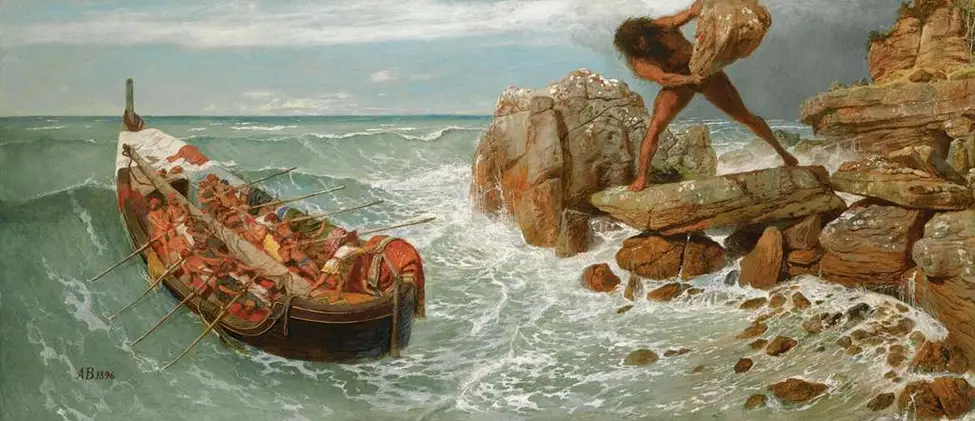Attribution: cdn2.picryl.com
In Homer’s epic of wandering and homecoming, The Odyssey, a battered man washes up on foreign shores. He is a stranger, cloaked in salt, exhausted, uninvited. But he is not turned away. Instead, he is fed, clothed, and heard. Why? Because he is a xenos, the Greek word for stranger, but also the word for guest. In ancient Greek thought, these identities were inseparable. The xenos bore both vulnerability and dignity from the sacred duty of xenia, the moral code of hospitality enforced by Zeus
Fast forward to our modern age, where global displacement is a pressing issue. Wars, persecution, climate crises, and poverty have forced over 70 million people from their homes, according to the UN.[1] And yet the question that haunted the halls of Odysseus’s hosts remains just as alive today: What do we owe the stranger?
Xenia: Sacred Hospitality in Ancient Greece
In Homeric Greece, xenia, or hospitality, was a sacred obligation, enforced by Zeus Xenios, the god Zeus as the protector of strangers and guests. Hurting a guest, stealing from them, or turning them away could be seen as offending Zeus himself and resulting in divine punishment. The rules of xenia involve offering food and shelter first and asking questions later. This ethic is dramatized powerfully in The Odyssey, where Odysseus is repeatedly helped (and sometimes betrayed) by foreign hosts.
This obligation of xenia played out in multiple episodes of The Odyssey, each one testing the fine line between hospitality and hostility. When Odysseus arrives at the island of the Phaeacians (Book 6–8), he is washed ashore, naked. Later, the Princess Nausicaa instructs her maids not to fear him, and her father, King Alcinous, offers Odysseus food, a seat of honor, and safe passage home, all before even asking his name. This ideal fulfillment of xenia reveals the virtue of trust extended in faith. The Phaeacians act justly because Odysseus is xenos, not because he is a hero
This hospitality did have boundaries, though. The stranger had to respect the host’s rules. Long-term asylum was rare. And, as Homer’s tale reveals, the guest could quickly become a burden or even a danger. The ethics of xenia were complicated by fear, suspicion, and the ever-present thought of war.
Consider the encounter with Polyphemus the Cyclops in Book 9. When Odysseus and his men enter the Cyclops’ cave, they expect the hospitality that Greek custom demands. Instead, Polyphemus mocks the idea of guest-friendship, declaring that the Cyclopes “care not for Zeus or his aegis.” He then brutally eats several of the men, violating both the custom of xenia and cosmic law. The punishment is swift as Odysseus blinds the Cyclops and escapes. This moment dramatizes what happens when xenia is desecrated, as divine retribution quickly follows.
Even subtler examples explore the ambiguities of this moral code. In Book 10, Odysseus is hosted by Circe, who initially turns his men into swine using magic, a clear breach in the code of xenia. But after Odysseus confronts her with cunning and courage, Circe transforms into a gracious host, restoring his men and offering shelter for a year. This change suggests that xenia is not fixed but can be negotiated, earned, or restored.
What made xenia so central, then? Perhaps it was the recognition that in a perilous, pre-modern world, anyone could become a stranger at any time. Hospitality was a form of mutual insurance, grounded in empathy, reciprocity, and divine justice. The stranger was not a threat to be shut out, but instead a test of character or a sacred opportunity to show justice.
From Homer to Hobbes: The Stranger in Modern Thought
Modern philosophy wrestles with the stranger in different, yet similar, ways. For the English philosopher Thomas Hobbes (1588-1679), the stranger is a potential threat in the “state of nature,” where life is “solitary, poor, nasty, brutish, and short.”[2] According to Hobbes, to protect themselves, people should establish a sovereign authority to enforce laws and ensure security with power. For the German philosopher Immanuel Kant (1724-1804), however, there is a “cosmopolitan right” to hospitality.[3] All people, by virtue of their humanity, have the right not to be treated with hostility when they arrive in a foreign land. This right is limited, but it is universal.
In contemporary debates over immigration and refugee resettlement, these tensions remain. On one hand, there are practical concerns: Can a nation afford to welcome thousands or millions of newcomers? What about cultural cohesion, security, or jobs? On the other hand, there is a moral imperative: If a person is fleeing death, persecution, or unbearable poverty, should that take precedent over the arbitrary legal lines drawn on maps?
Today, philosophers like Martha Nussbaum and Seyla Benhabib argue for an ethics of global responsibility rooted in shared humanity. Nussbaum urges us to see ourselves as citizens of the world, bound by obligations that transcend national borders.[4] Benhabib insists that democratic states can both preserve sovereignty and respect the rights of migrants and refugees, but only if they reject xenophobia and embrace inclusive deliberation.[5]
Ancient Insights for Modern Crises
So, what does Homer have to do with issues of migration today? Quite a lot.
First, The Odyssey reminds us that the question of the stranger is not new. It is an ancient, existential, and deeply human question. Whether cloaked in the rags of a shipwrecked Greek or the lifejacket of a Syrian child, the stranger has always invoked both compassion and fear.
Second, ancient xenia reveals that hospitality is a form of justice. Even when framed in religious or reciprocal terms, the Greeks recognized that to receive the vulnerable is to affirm their dignity. This insight resonates with modern human rights discourse that all people, regardless of origin, possess inherent worth.
But the ancient world also warns us of the fragility of this idea. When fear triumphs over hospitality, when people are treated as subhuman, societies lose not only their moral compass. In Homer’s epic, the Cyclops, who sees no law, no guest rights, and no moral obligation to the vulnerable, is not a hero but a monster.
What Do We Owe the Stranger?
This is both a policy and a philosophical question. It asks us to decide what kind of society we wish to be: fearful and closed, or open and courageous. It asks us to see ourselves in others’ shoes, as potential strangers, because one flood, one war, one accident could make us migrants seeking aid, too
Perhaps the answer lies in a combination of the ancient and the modern. From the Greeks, we inherit the sacredness of hospitality. From modern philosophy, we learn the language of rights and global responsibility. And from both, we learn that the stranger is not an enemy but a canvas upon which we can reveal who we truly are.
In a world that is more mobile and more interconnected than ever before, our moral obligations to the migrant, the refugee, and the stranger demand both ancient wisdom and modern resolve. From Odysseus to our own shores, the question echoes: What do we owe the stranger?
Let’s make sure our answer considers deeply both justice and humanity.
References
- What is internal displacement? (2025). UNHCR. Retrieved July 15, 2025, from https://www.unhcr.org/us/about-unhcr/who-we-protect/internally-displaced-people
- Hobbes, Thomas. Leviathan. 1651. Edited by Richard Tuck, Cambridge, Cambridge University Press, 1996.
- Immanuel Kant, Johnston, I., & Orend, B. (2015). On perpetual peace: a philosophical sketch. Broadview Editions.
- Nussbaum, M. C. (1996). For Love of Country. Boston: Beacon Press.
- Benhabib, S. (2004). The Rights of Others: aliens, residents, and Citizens. Cambridge Univ. Press.
- Homer. (2018). The Odyssey (E. Wilson, Trans.). W.W. Norton and Company.

